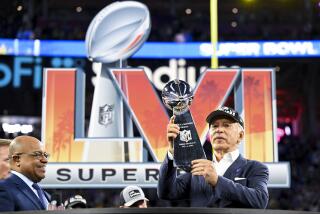Cooke Found Time To Become a Winner
- Share via
When billionaire businessmen buy into major league sports, few succeed. It’s harder for pro teams to win than they--or their fans--suspect. It takes a lot of time to learn football or baseball or basketball. And a business genius who is busy piling millions on top of millions, year after year, can’t find the days or hours he needs to master competitive sports.
Jack Kent Cooke was different.
Cooke, who died Sunday at 84, made time to understand the cable television industry, the financial markets and the major leagues.
He won in all three.
Because he worked at it, Cooke was a winner on two sports stages:
* Nationally, his definitive accomplishment was restoring the greatness of the Washington Redskins. Once a champion with quarterback Sammy Baugh, the Redskins had been in a decades-long slump when Cooke, moving in as their majority owner, restored order, taking them to five Super Bowls, three of which they won.
* On the California stage, Cooke was the entrepreneur most responsible for turning Los Angeles into a basketball town from whatever it was when the Rams were here and the Dodgers were winning. As owner of the Lakers, Cooke traded for Kareem Abdul-Jabbar and drafted Magic Johnson.
Other Laker executives opposed him both times.
The most knowledgeable Laker all these years, their voice, Chick Hearn, once told me: “I wouldn’t have made that trade, and I might not have gone that way in the draft.”
Of the capitalists Cooke beat in business or sports, few realized that his main weapon was the research he made into the lives, values and potential of the persons he needed to win.
That led him to take Hearn’s advice most of the time. And it led him to hire Abdul-Jabbar, Johnson, Joe Gibbs, George Allen and Bobby Beathard, among other winners.
In Washington, which had been a famous loser most of the time since the 1930s, hiring Allen to coach the 1970s Redskins was their turning point. As the NFL’s first billionaire club owner, Cooke brought in Allen for seven years that turned both houses of Congress into Redskin rooting sections.
Then, when Allen defected to begin his ill-fated second tour with the Rams, Cooke hired Gibbs, who in four Super Bowls coached three Redskin winners.
As a football man, Cooke was never a power or even much of a leader in the NFL, where--except for Al Davis--he was the league’s most conspicuous loner. Cooke seldom attended NFL meetings.
“The others think he’s too abrasive,” former commissioner Pete Rozelle once said.
Indeed, Gibbs, Allen and Cooke’s most effective general manager, Beathard--who all left him voluntarily--all called him an abrasive know-it-all, which he was.
Simultaneously, Cooke was ever a pleasant companion. Son of a Canadian businessman who prospered as a manufacturer of picture frames, Cooke chose conversational topics as diverse as journalism, wine and music. One time, he told me his lifelong ambition was to own the Los Angeles Times.
One time at his home, when I asked for an ice cube, Cooke, who was tending bar, refused. “Nobody puts ice in my wine,” he said.
And one time, he confessed that he was by instinct and preference a professional musician.
“I’d still be playing saxophone in my own band if there were any money in it,” he said one day on a ride from his Virginia home to Redskin football practice.
A moment later, at the wheel of an old Cadillac, Cooke put on a tape with the “Phantom of the Opera” score and sang along at the top of his voice.
When he pulled up at a stop sign in Middleburg, Va., he turned and asked me to roll up my window. Pointing toward a pedestrian, he said, “I don’t want to disturb that lady.”
At football practice later, Cooke, seated with a sportswriter in one of two sideline chairs, suddenly whispered that it looked like the Redskins were practicing a tricky new formation with three tight ends instead of the usual one or two.
“Isn’t that a third tight end?” he asked.
“I’m not sure,” the reporter said.
So Cooke asked Gibbs, who, swearing everyone to silence, confirmed it.
And that, possibly, is what it takes to get to the Super Bowl five times: a billionaire owner who can recognize three tight ends.
More to Read
Go beyond the scoreboard
Get the latest on L.A.'s teams in the daily Sports Report newsletter.
You may occasionally receive promotional content from the Los Angeles Times.










